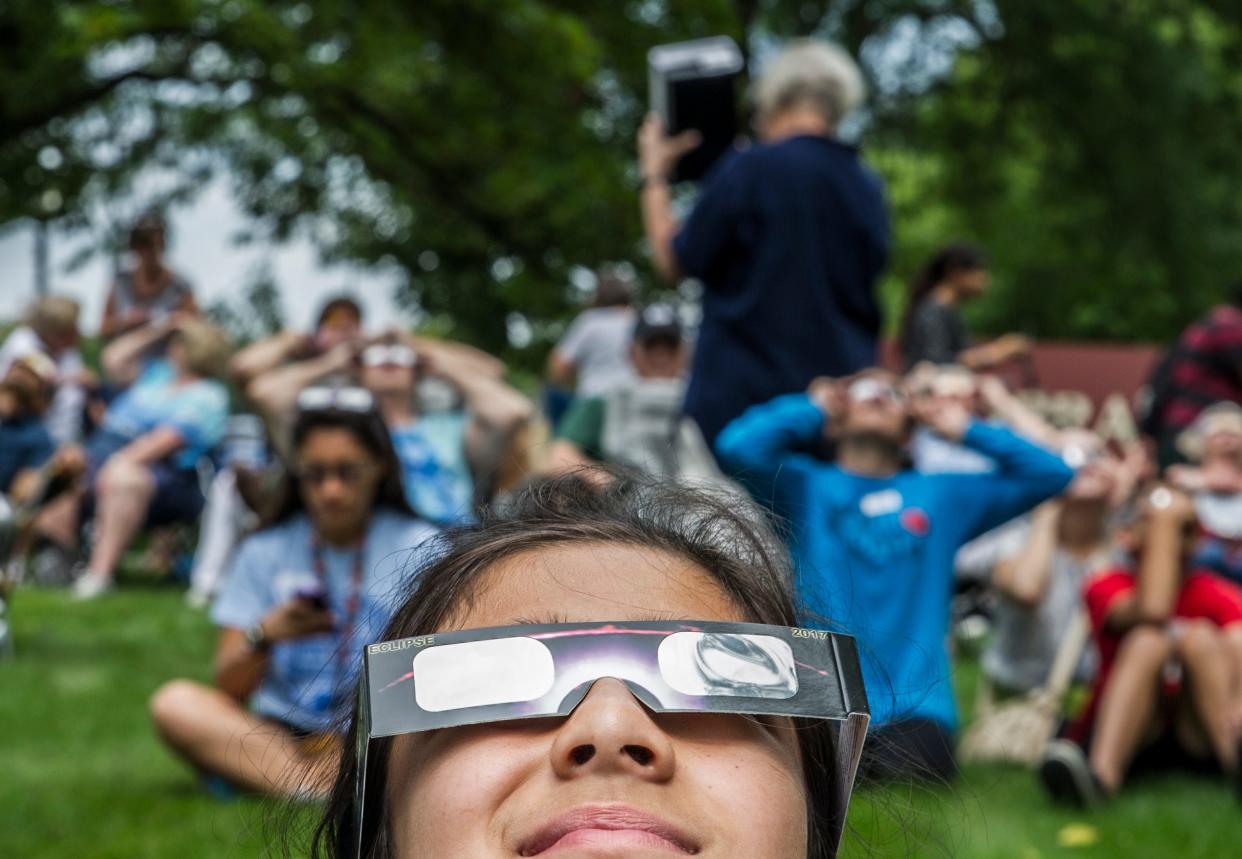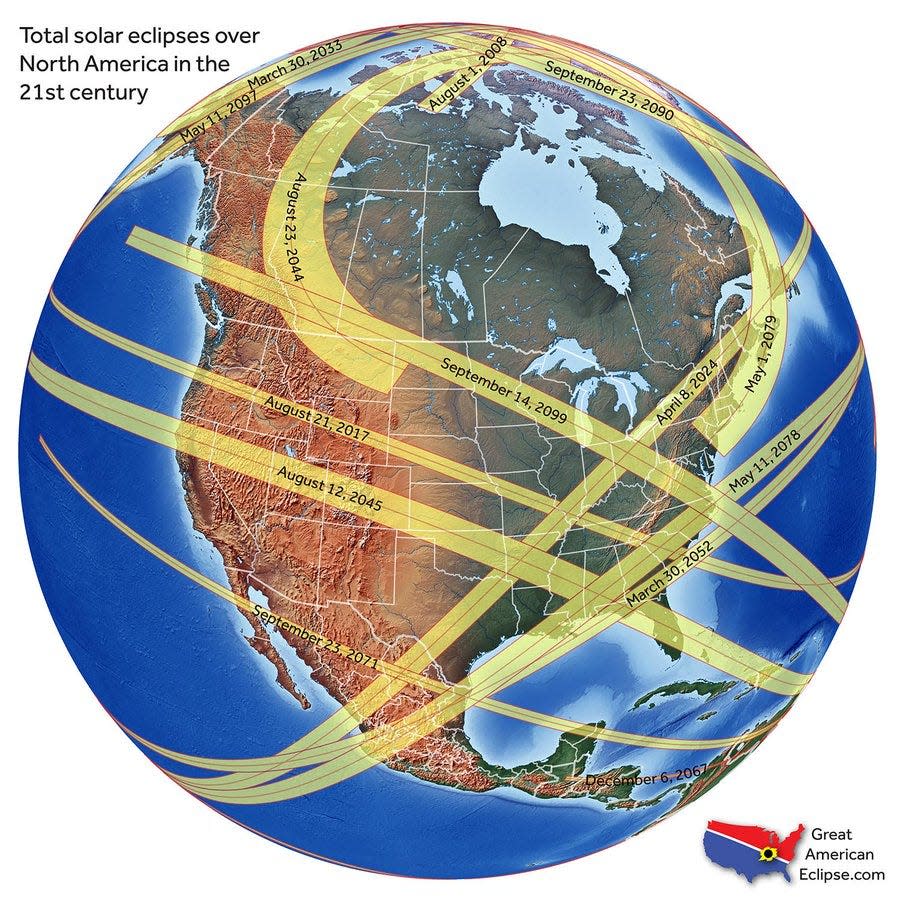When is the solar eclipse today? Here's what to know about Wisconsin's forecast, glasses, local events and more
A total solar eclipse will darken the skies Monday across the continent.
Milwaukee isn't on the path of totality, but will experience about 90% coverage. The eclipse is expected to peak about 2:08:10 p.m. in Milwaukee. It will begin at 12:53:00 p.m., and it will reach 50% of the maximum coverage at 1:33:50 p.m. After peaking at 2:08:10 p.m., 50% of the maximum coverage will again be visible at 2:42:20 p.m. The eclipse will end in Milwaukee at 3:21:50 p.m.
If you live in the southeastern parts of the state — including Milwaukee, Racine, Kenosha, Lake Geneva and Janesville — you have the best chance out of anywhere in Wisconsin at seeing the partial solar eclipse. Much of the state is expected to have cloud cover that could obscure it, though when those clouds will move out and open up a view of the rare phenomenon is still up in the air.
10:10 a.m. - How to take a photo of the eclipse with your phone
You can capture Monday's solar eclipse in Wisconsin with your cellphone, according to NASA.
You'll need to use a solar filter to protect your camera, and you'll also need a pair of solar viewing glasses to protect your eyes.
For more information on how to best capture the eclipse, you can visit NASA's website.
— Alex Groth
9:30 a.m. - Where to find eclipse glasses in and around Milwaukee, free solar eclipse glasses
Eclipse glasses are available for free, while supplies last, at Warby Parker. There are two Warby Parker locations in Wisconsin, in Milwaukee's Third Ward and blocks from the state capitol building in Madison.
Glasses will also be given out at some local events. You can find a list of viewing events here. Glasses will also be sold in some stores, such as American Science and Surplus, 6921 W. Oklahoma Ave., Milwaukee. Eclipse glasses are available for purchase while supplies last.
If you can't get your hands on some glasses, you can try your hand at crafting a DIY pair. Eclipse viewers can be made out of common household items such as cereal boxes, colanders, and cardboard or paper tubes. Tutorials on how to make your own glasses are available here.
— Steve Martinez
8:45 a.m. - Eclipse forecast shows clear skies in Milwaukee, clouds likely in western Wisconsin
Despite some worries last week that cloud cover might make the partial eclipse difficult, if not impossible, to see from Milwaukee, the National Weather Service said Monday morning that the forecast looks promising for viewing the astronomical event from our area.
"As we've gotten closer to today ... the skies have become more clear," said local NWS meteorologist Mark Gehring.
The Milwaukee area is expected to see clear skies this morning and potentially a few light clouds in the afternoon. The day is expected to be sunny, with a high of 63 degrees.
Other areas of the state might not have as much luck viewing the eclipse. A low-pressure system currently casting clouds over Iowa could make eclipse-viewing difficult from west-central Wisconsin, Gehring said. Clouds are also in the forecast for northern Wisconsin and much of Minnesota.
Mostly clear skies this morning will give way to some thinner higher clouds this afternoon especially northwest, while less clouds expected for southeast WI. Be safe and protect your eyes during the eclipse! #wiwxpic.twitter.com/Xta1Xd379c
— NWS Milwaukee (@NWSMilwaukee) April 8, 2024
La Crosse is currently experiencing partly cloudy conditions, Gehring said. It's possible these don't clear in time for eclipse-viewing from the La Crosse and Eau Claire areas, but the "heating of the day" could sufficiently break up the clouds.
—Claire Reid

What time is the solar eclipse in Madison, Janesville and other southern Wisconsin cities?
As the eclipse travels along its southwest-to-northeast path across the country, cities in western Wisconsin will see it slightly before the Milwaukee area. However, cities in southeastern Wisconsin are closer to the path of totality than those in the west and will perhaps see more noticeable overcast skies during the partial eclipse's peak.
Here's when the eclipse will peak in some of southern Wisconsin's major cities:
Platteville: The partial solar eclipse will reach its peak at 2:04:30 p.m. in Platteville when the moon covers 86% of the sun. The city will experience the eclipse from 12:49:20 p.m. to 3:18:30 p.m. Residents can see the eclipse at 50% of its peak coverage at 1:29:20 p.m. and again at 2:39:30 p.m.
Richland Center: The eclipse will reach its peak at 2:05:10 p.m., and the moon will cover 84% of the sun. Richland Center will experience the partial solar eclipse from 12:50:30 p.m. to 3:18:40 p.m. The eclipse will be at 50% of its peak coverage at 1:29:50 p.m. and again at 2:40:10 p.m.
Madison: The eclipse will reach its peak at 2:06:10 p.m. when the moon covers 86% of the sun. The city will see the partial eclipse from 12:51:10 p.m. to 3:19:50 p.m. Madisonians can see the eclipse at 50% of its maximum coverage at 1:31:10 p.m. and 2:40:50 p.m.
Janesville: The eclipse will peak at 2:06:30 p.m., and the moon will cover 88% of the sun. Janesville will experience the eclipse from 12:51:10 p.m. to 3:20:20 p.m. The eclipse will be at 50% of its peak coverage at 1:31:50 p.m. and again at 2:40:50 p.m.
Waukesha: The eclipse will reach its peak at 2:07:40 p.m. when the moon covers 89% of the sun. Waukesha will see the partial solar eclipse from 12:52:30 p.m. to 3:21:20 p.m. Skywatchers can view the eclipse at 50% of its maximum coverage at 1:33:10 p.m. and again at 2:42:00 p.m.
Kenosha: The eclipse will reach its peak at 2:08:00 p.m., and the moon will cover 91% of the sun. Kenosha will experience the eclipse from 12:52:30 p.m. to 3:21:50 p.m. Residents can see the eclipse at 50% of its maximum coverage at 1:33:40 p.m. and 2:41:50 p.m.
— Claire Reid
What time is the solar eclipse in Wisconsin?
For those living outside Milwaukee, you can enter your ZIP code, or select your city, below to see when the solar eclipse will reach your area and for how long, as well as what percent of the sun will be obscured at the eclipse's peak.
Can't see our graphics? What time is the total solar eclipse on April 8? Search your ZIP code for a viewing guide
What will the weather be like in Wisconsin, Milwaukee for the total solar eclipse?
Much of the state is expected to have cloud cover that could obscure the eclipse, though when those clouds will move out and open up a view is still up in the air. The timing could become more certain by late Monday morning.
"It is going to be dicey as far as cloud cover goes," explained John Gagan from the National Weather Service in Milwaukee. "Milwaukee will kind of be in an area where they could see some clearing, but I don't know if we're going to see 100% clear skies."
Going north and west from Milwaukee, it's more likely that clouds will prevent seeing the eclipse. For example, Madison is right on the line. It's "entirely possible" that the skies could clear up in time, especially because the eclipse peaks around 2 p.m. there.
The same is true for northeastern Wisconsin. Appleton and Green Bay will start the day with "quite a bit of cloud cover," but skies will partially clear by the late morning or early afternoon, explained Scott Berschback from the National Weather Service in Green Bay.
— Hope Karnopp
Here are some Milwaukee area solar eclipse events
Even if the weather puts a damper on your eclipse plans, you can still mark the rare astronomical occasion with these indoor or virtual events in the Milwaukee area:
UW-Milwaukee: UWM will offer indoor activities, including a livestream of the total solar eclipse, free pizza, a photo booth and photo station, and a variety of astronomy-themed crafts, in the Union Ballroom from 1 to 3 p.m. on Monday. An outdoor eclipse watch and activities will take place, too, weather permitting. More: Solar Eclipse Viewing Party | Manfred Olson Planetarium.
Milwaukee Public Museum: MPM will stream NASA's live webcast of the total solar eclipse and has indoor educational activities planned in the event of inclement weather. Outdoor viewing and activities are also planned. Monday, 12:30 to 3 p.m. More: 2024 Solar Eclipse Watch | Milwaukee Public Museum.
Brookfield Public Library: The library will host a free, indoor stream of NASA's live webcast in the library's community room. Monday, 12:30 to 3:30 p.m. More: Brookfield Public Library • Solar Eclipse Streaming.
— Claire Reid, Jordyn Noennig
More local eclipse events:Can't travel for the April 8 solar eclipse? Experience it at these Milwaukee eclipse events

When is the next total solar eclipse in Wisconsin after 2024?
After Monday, the lower 48 states won't see another total solar eclipse until Aug. 23, 2044. However, only three states ― Montana, North Dakota and South Dakota ― will be on its path of totality. According to NationalEclipse.com, most Western and Midwestern states, including Wisconsin, will see a partial eclipse during this event.
Thankfully, you won't have to wait another 20 years for the next total solar eclipse, though. Less than a year later on Aug. 12, 2045, another one will grace the skies. Its path of totality will touch South America, the Caribbean and 15 U.S. states from California to Georgia. Wisconsin and most of the Midwest will again see a partial eclipse.
The next time Wisconsin will be on the path of totality for a total solar eclipse will be Sept. 14, 2099, said Dr. Jean Creighton, director of the University of Wisconsin-Milwaukee's Manfred Olson Planetarium. Milwaukee and much of the rest of the Midwest will be on the path, according to NASA.
Wisconsin was last on the path of totality 70 years ago. Northwestern portions of the state, including Spooner and St. Croix Falls, experienced totality on June 30, 1954. Meanwhile, Milwaukee hasn't seen totality since the Middle Ages, Creighton said. The city hasn't been on the path of a total solar eclipse since May 16, 1379.
— Claire Reid
This article originally appeared on Milwaukee Journal Sentinel: Solar eclipse 2024: Wisconsin forecast, Milwaukee events, eclipse time
